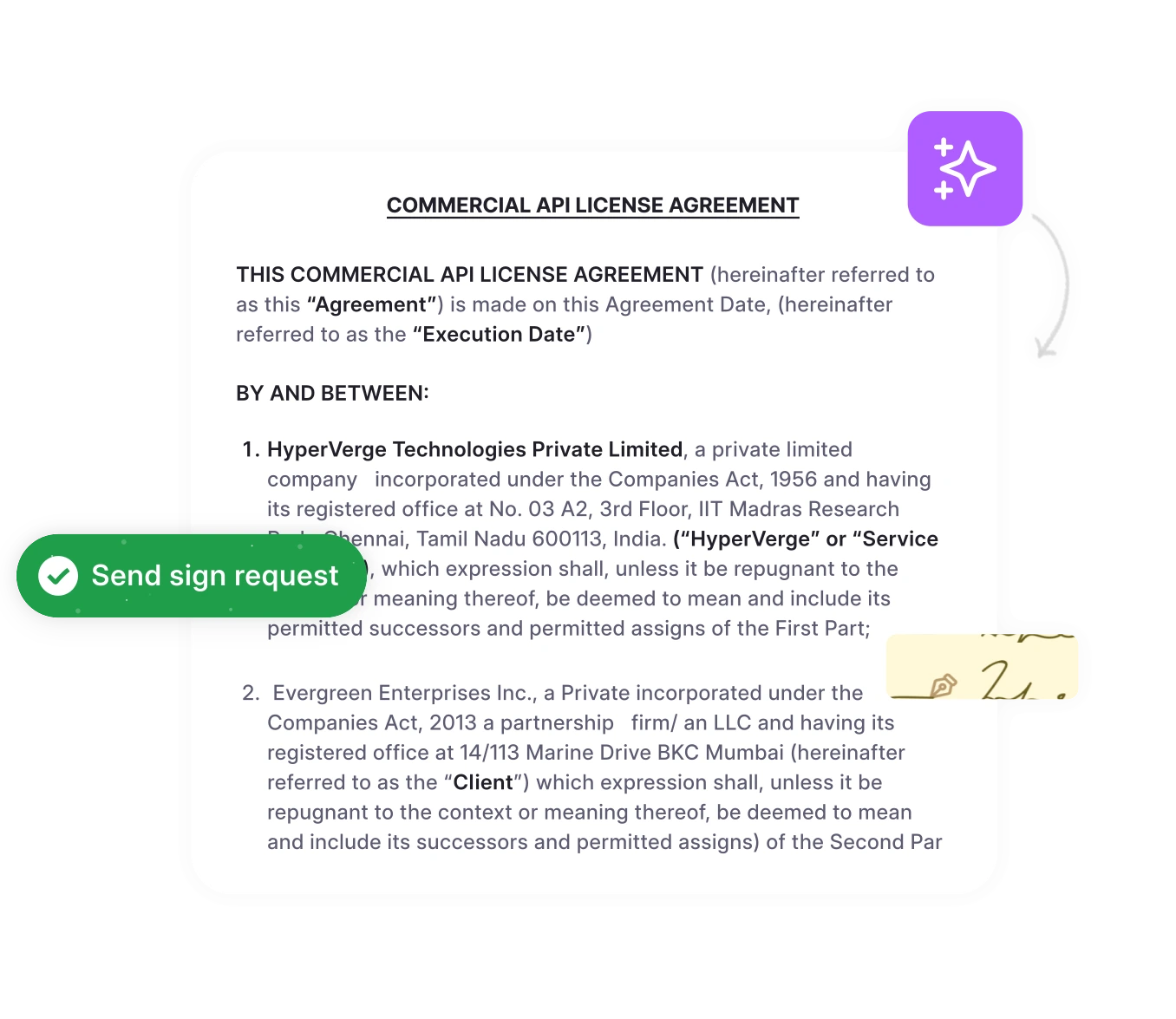Every business relationship, agreement, or partnership is built on a time bound contract. This point in the contract lifecycle is when the contract expired needs to be either renewed or terminated. When a contract expires, the terms and contract obligations outlined within it either come to a close, roll over into a new agreement, or trigger renewal negotiations.
Understanding what contract expiration means and how to manage it effectively is crucial for organizations of all sizes. Failing to track expiration dates can result in missed opportunities, compliance risks, unnecessary costs, or even disputes. On the other hand, proactively managing expirations ensures smoother renewals, stronger partnerships, and better financial outcomes.In this guide, we’ll break down the meaning of contract expiration, what happens when an agreement reaches its end date, the legal and financial implications, and the best practices for managing expirations with confidence.
What Contract Expiration Really Means and Why It Matters
Contract expiration refers to the natural end of a contract after its agreed-upon duration or end date has passed. Once a contract expires, the obligations of both parties generally come to an end—unless there are clauses that extend specific responsibilities, such as those related to confidentiality or warranties. In simple terms, it marks the completion of a contractual term without requiring active cancellation.
To fully understand contract expiration, it’s essential to see how it differs from contract termination.
Contract Expiration vs. Contract Termination: Understanding the Difference
In short, expiration is a natural conclusion, whereas termination is the early termination of the agreement.
Beyond this distinction, contract expiration is also referred to in different ways across industries and legal contexts.
Legal counsel advises that expired contracts cannot be revived or amended. New agreements must be drafted if parties want to continue business. Relying on verbal or implied arrangements post-expiry creates legal risk—only written renewals or extensions are enforceable. It’s crucial to document renewals before expiry and clarify which obligations survive, such as confidentiality or warranties.
Read →
Standard Terms and Synonyms for Contract Expiration
These phrases are often used interchangeably, but they all describe the same process: the contract reaching its final date and ceasing to be active.
With the meaning, differences, and terminology covered, the next step is to explore the key elements that define contract expiration in practice.
Don’t Let Contracts Expire Unnoticed
Take control of contract renewals and expirations with automated obligation tracking and alerts.
Book a DemoKey Elements That Define Contract Expiration
The way a contract expires isn’t random—it depends on specific terms and clauses written into the agreement. Understanding these elements ensures both parties are prepared for what happens when the contract reaches its end.
Let’s start with the most basic yet essential part of every contract: the contract terms.
1. Contract Terms: Start Date, End Date, and Duration
Every contract specifies a precise start date, an end date, and the overall duration of the agreement. These details outline the duration of the obligations. For example, a 12-month employment contract that begins on January 1 will naturally expire on December 31, unless it is extended.
Along with these dates, most contracts also include an expiration clause that governs what happens once the end date approaches.
2. Expiration Clauses: Renewal Terms, Notice Periods, and Extension Conditions
An expiration clause outlines what occurs when a contract is nearing its end. This can include:
For instance, a service agreement might automatically renew for another year unless one party provides 30 days’ written notice before the expiration date.
Together, these contract expiration terms define not only when an agreement ends but also how both parties can plan for renewals, renegotiations, or closure.
3 Different Types of Contract Expiration and How They Work
Contracts can reach their end in various ways, depending on their structure and the terms agreed upon. Understanding the types of contract expiration helps businesses and individuals plan for renewals, extensions, or closures.
1. Fixed-Term Contracts: Straightforward Expiration
Fixed-term contracts have a clear start and end date, making their expiration straightforward and predictable. Common examples include employment contracts with a specific duration, project-based agreements, or lease agreements. Once the end date is reached, the contract naturally expires unless both parties agree to extend it.
Example: A one-year lease agreement that begins on January 1 and ends on December 31 will automatically expire at the end of the year unless it is renewed.
While fixed-term contracts are simple, not all contracts have predetermined end dates.
2. Indefinite Contracts with Cause: Flexible but Monitored
Indefinite contracts do not specify a fixed end date. Instead, they remain in effect until one party terminates the agreement for a defined cause, such as a breach of contract, failure to meet performance standards, or mutual agreement to end the relationship. These contracts require careful monitoring to ensure obligations are met continuously.
Example: An ongoing consulting agreement that continues until either party decides to terminate due to non-performance or mutual consent.
Even more common in subscription and service models are contracts that renew automatically unless action is taken.
3. Automatic Renewal (Evergreen) Contracts: Continuous Agreements
Automatic renewal contracts, also known as evergreen contracts, continue indefinitely until one party provides notice to terminate. These agreements typically include a renewal clause that automatically extends the contract for a new period unless notice is given within a specified timeframe.
Example: A SaaS subscription agreement that renews yearly unless the client cancels 30 days before the renewal date.
Legal experts stress that once a contract expires, the obligations generally end unless specific clauses survive, such as confidentiality or indemnity. Failure to proactively manage contract expirations can lead to gaps in legal protection, operational risks, and unintended automatic renewals. Counsel recommends employing clear expiration timelines, early notifications, and formalizing renewals or terminations to avoid disputes and ensure compliance.
Read →
What Happens When a Contract Reaches Its Expiration Date
When a contract reaches its expiration date, several outcomes are possible depending on the terms of the agreement and the intentions of the parties involved. Understanding these outcomes is crucial for managing obligations and avoiding legal or operational risks.
1. Renewal or Extension: Automatic and Manual Options
One of the most common outcomes is that the contract is renewed or extended. This can occur automatically if an automatic renewal clause is in place, or manually through mutual agreement. Renewal allows the business relationship to continue seamlessly, often with updated terms, pricing, or scope of services.
Example: A one-year service agreement may automatically renew for an additional year unless either party provides at least 30 days’ notice of termination.
Not all contracts continue, however—some simply terminate when they expire.
2. Termination: Rights and Obligations Conclude
If neither party opts for renewal or extension, the contract terminates naturally at the end of its term. Upon termination, the rights and obligations defined in the contract cease to apply. This type of conclusion is standard for fixed-term agreements, ensuring that both parties are aware of when their responsibilities officially come to an end.
Example: A consulting contract that ends on December 31 without renewal means the consultant is no longer obligated to provide services, and the client is no longer required to make payments beyond that date.
Even after expiration, specific responsibilities may still be in effect, depending on the contract terms.
3. Post-Expiration Obligations: What Survives After the End Date
Some contractual obligations survive the expiration date. Common post-expiration obligations include confidentiality agreements, warranties, indemnities, or non-compete clauses. These clauses protect the interests of the parties even after the main contract has concluded.
Example: A software licensing agreement may require continued protection of proprietary information for one year after contract expiration.
If a contract isn’t renewed, it’s essential to understand the potential risks from lapses in obligations.
4. Risks of Lapses in Obligations After Expiration
When a contract expires without renewal, any obligations tied to that contract may lapse. This can lead to operational disruptions, including gaps in service delivery, supply chain interruptions, or missed payments. Businesses must proactively manage contract expirations to avoid negative consequences.
Example: An expired supplier contract without renewal may require a company to find alternative vendors quickly, potentially leading to delays or increased costs.
With these outcomes in mind, the next section outlines the step-by-step process for contract expiration, including timelines, responsibilities, and notifications, to ensure smooth transitions.
Take Control of Your Contract Expirations
Don’t wait for contracts to expire—proactively track, manage, and renew your agreements to reduce risks. Hyperstart streamlines contract lifecycle management efficiency and simplicity.
Book a DemoStep-by-Step Contract Expiration Process for Businesses
Managing contract expiration effectively requires a structured process. A clear timeline, defined responsibilities, and timely notifications ensure that all parties are prepared and that no obligations are overlooked.
1. Setting a Timeline Before Expiration (30, 60, 90, 180 Days)
Most contracts benefit from a predefined timeline leading up to the expiration date. Businesses often set reminders at intervals such as 30, 60, 90, or even 180 days before a contract ends. This timeline allows adequate time to review obligations, initiate renewal discussions, or make alternative arrangements.
Example: A service agreement may trigger a 90-day reminder for legal and procurement teams to review renewal options, ensuring that decisions are made well in advance of the contract expiration.
Along with a timeline, understanding the responsibilities of each party is crucial to ensure a smooth transition.
2. Responsibilities of Both Parties Leading Up to Expiration
As a contract approaches its expiration, both parties have specific duties. These typically include:
Clearly defined responsibilities reduce confusion, prevent disputes, and foster professional relationships beyond the contract term.
Even with clear responsibilities, timely communication through notifications is essential to keep all stakeholders informed.
3. Using Notifications and Automated Tools for Timely Reminders
Contract expiration reminders help businesses stay proactive and avoid last-minute disruptions. Many organizations leverage contract management software to automate notifications and alerts. Features often include:
Automated reminders minimize the risk of missing a deadline.
3 Legal Implications and Risks of Contract Expiration
When a contract reaches its end date, the legal landscape doesn’t always end with it. Understanding the implications is crucial to avoid disputes, financial loss, or compliance issues.
1. Continuing Obligations After Contract Expiry
Even after a contract expires, certain obligations may continue to exist according to the terms of the agreement. Common examples include:
Recognizing these continuing responsibilities helps parties avoid unintentional breaches and ensures the ongoing protection of their interests.
Beyond surviving obligations, failing to manage expired contracts properly can expose businesses to significant risks.
2. Risks of Operating Under Expired Contracts
Continuing business activities without formally renewing or extending an expired contract can create legal and operational risks:
Properly tracking expiration dates and formalizing actions helps mitigate these risks effectively. In addition to general risks, breaches or disputes near the expiration date require careful attention.
3. Handling Breaches or Disputes Near Expiration
Disputes can arise when parties misunderstand obligations or miss deadlines near the contract’s end. Effective strategies include:
Proactively addressing these challenges ensures smoother transitions and preserves professional relationships.
Contract Renewal Options and Negotiation Strategies
Contracts don’t always end when they reach their expiration date. Many agreements include provisions for renewal, and proactively managing these options can help maintain continuity in business relationships and avoid operational disruptions.
Understanding Different Renewal Terms: Automatic, Manual, and Renegotiated
Contracts may include different types of renewal mechanisms:
Understanding these renewal options ensures that businesses can plan and avoid unintended lapses or disputes.
Alongside knowing the types of renewal, following best practices for renegotiation is essential for achieving favorable outcomes.
Best Practices for Successful Contract Renegotiation
Effective renewal negotiations require preparation, clear communication, and strategic planning. Best practices include:
By following these practices, parties can achieve smooth renewals and strengthen ongoing business relationships.
Take Control of Your Contract Expirations
Managing contract expirations effectively isn’t just about tracking dates—it’s about staying proactive, reducing risk, and maintaining smooth business operations. By understanding the key elements, processes, and legal implications of contract expiration, you can ensure that every agreement is managed strategically and no obligation or opportunity is missed.
Take action today by auditing your contracts, setting up automated reminders, and preparing for renewals or renegotiations. Leveraging contract management software can streamline these tasks, giving you complete visibility and control over your agreements.
Key takeaway: Don’t wait for contracts to expire—plan ahead, stay organized, and turn contract expiration from a potential risk into a business advantage.











